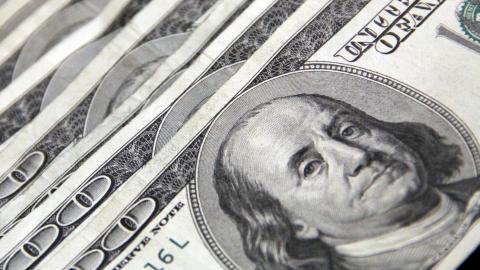
Today, the FED raised the overnight borrowing rate by 0.50%, the biggest one-time hike in rates in over 20 years. Conventional wisdom and Economic textbooks tell us that higher rates should lead to stronger demand for a nation's national debt while curbing inflation. And this was certainly the case in the 1980's.
But could the current situation in the US be different, and why?
Obviously, a US Treasury yielding 3% is more attractive than a US Treasury yielding 1%. So, more buyers should be attracted to US Treasuries at 3% than at 1%. But what about those already holding US Treasuries? Specifically, what about foreign holders of several Trillion dollars worth of US Treasuries? When interest rates go up, the bonds already held by foreign investors must depreciate. To provide a yield commensurate with the newly issued bonds, existing holdings will need to depreciate by the increase in yield multiplied by the years until the bond matures. For example, a 10-year US treasury issued one year ago (i.e. 9 years to maturity) yielding 1% will depreciate in the neighborhood of 18% when the yield for newly issued 10-year treasuries is at 3%.
At what point may foreign-run sovereign wealth funds decide to dump their US Treasury holdings knowing full well that the FED will deliberately drive down the value of their holdings? And at what point would wholesale liquidation of existing US Treasuries overwhelm the supply of newly issued US Treasuries causing rates to spiral out of control? If this tipping point occurred, then raising rates would quickly become futile.
My fear is if foreign holders of US Treasury debt start selling their positions, it could negatively impact our economy in multiple ways, some obvious and some not so obvious. On the obvious side, higher rates could restrict our economy, especially in cyclical areas like housing and cars. With that said, the FED has used QE to bring down rates so I assume that if rates spike much higher, the FED can easily step in and curb rates with more QE.
The not-so-obvious unintended consequence of the FED's inflation-fighting tactics is that they may lead to far more inflation. Here is how it could play out. For over 50 years, consumers in the US exchanged USDs for tangible goods made overseas. Thus far, foreign manufacturers have been willing to except USDs for goods. I refer to this as "exporting inflation." We make money, they make stuff. One of the biggest potential risks to our economy is that foreign trading partners will become increasingly less willing to accept US Dollars (USD) in exchange for foreign-made tangible goods. If so, either the FED has to disengage from monetary inflation, which I believe is highly unlikely, or monetary inflation with nowhere to go will stay on our shores manifesting itself as price inflation.
This is already bearing out in a couple of ways. First, there are "supply chain shortages". Yes, Covid caused various disruptions in production but I believe that part of the stress in the supply chain is a result of some foreign manufacturers deciding they no longer want USDs that can be radically debased at the FED's whim. Second, there is Russia, a fairly substantial economy, which has already made a clean break from the USD. They liquidated nearly all of their USD reserve holdings and will no longer do business in USDs wherever possible.
Now back to the FED and raising rates.
It is a given that current holdings of US Treasury debt by sovereign wealth funds dwarf any new purchases of US Treasury debt. So while higher rates make new purchases more appealing, it makes their current holdings far less appealing. What happens if, in anticipation of the FED raising rates, foreign holders of US Treasury bonds engage in the wholesale liquidation of their holdings? Obviously, it would put even more downward pressure on bond prices forcing them rates even higher. But less obvious and potentially far more important, it makes the prospect of recycling USDs into US Treasuries far less attractive. Who is going to buy US Treasuries while everyone else is selling them? And if foreign manufacturers have nowhere to recycle their USDs, why continue to accept them?
If foreign holders of US Treasuries do engage in the net liquidation of their Treasury holdings (i.e. selling more than they are buying) the FED could find themselves in quite a conundrum. Raise rates to fight inflation but then jeopardize foreigners liquidating all their USD holdings thus making them less dependent on a strong USD. And once the USD weakens, they become even less likely to accept USDs. And the cycle then feeds on itself. If that were to happen, the US could no longer export monetary inflation thus leading to domestic price inflation.
As mentioned above, Russia has already positioned itself to operate sans the USD. And consequently, we are seeing a massive spike in the price of commodities derived from Russia, such as wheat and oil. What happens if other major economic players join the fray? What happens to sugar prices if Brazil no longer accepts USDs? Coffee prices if Vietnam or Columbia are weaned off the USD? With a global supply chain all too dependent on everyone accepting USDs, it is not out of the question that the global supply chain seizes up if sufficient trading partners quit accepting USDs.
I hope the FED can navigate a "soft-landing". But I think we need to consider alternative outcomes. What if the FED's actions backfire? Too often, the consensus in capital markets is wrong. As Jim Rogers says, "When everyone moves to one side of the boat, the boat is liable to capsize." Today, the markets voted "loud and clear" that the FED will navigate a soft-landing and bring inflation under control. But shouldn't a piece of your investment portfolio be positioned in case the consensus is wrong, again?
